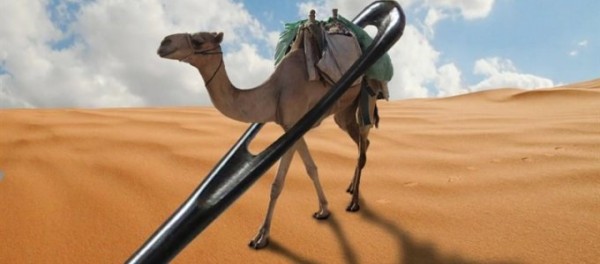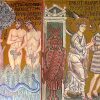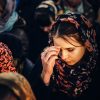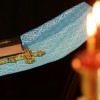“It is easier for a camel to go through the eye of a needle than for a rich man to enter the kingdom of God”.
This statement by our Lord has been the subject of some debate among Christians for centuries. There have been so many attempts to interpret this saying in a way that turns Christ’s words into a statement about the difficulty rather than the impossibility of the rich inheriting the kingdom of God, that it makes one wonder if, like the rich young man in today’s Gospel passage, certain people are merely trying to justify themselves. Here are two of the best-known interpretations of the above passage:
1) Camel is a mistranslation. The original Greek tells not of a camel (kamelos), but a rope (kamilos). When it was translated into Latin, rope was confused with camel. Therefore, what Christ really said was “it is easier to pass a rope through the eye of a needle than for a rich man to enter the kingdom of God”.
This is utter nonsense! The original Greek says kamelos (camel), not kamilos (rope). The latter is found in a few late manuscripts/lectionaries, mostly 11th century or later, and in one 9th or 10th century manuscript. The oldest manuscripts are unanimous in reading camel.
2) There was in Jerusalem’s city wall, a narrow gate known as the “eye of the needle”. It was very difficult for a camel to pass through this gate. Either the camel would have to be unloaded or pass through on its knees.
The big problem with this interpretation is that there is no historical evidence whatsoever to support the existence of such a gate!
What betrays the ridiculousness of these interpretations is today’s Gospel Reading itself: ‘When the disciples heard this, they were greatly astounded and said, “Then who can be saved?” But Jesus looked at them and said, “For man it is impossible, for God all things are possible”.’
Clearly our Lord is speaking of an impossibility, not a mere difficulty. And yet Christ gives hope even to the very rich: “For man it is impossible, for God all things are possible”.
But why does Christ tell us that it is impossible for the rich to enter the kingdom of heaven? What is so terrible about wealth?
St Basil the Great regarded great wealth as equal to not loving our fellow human beings, as he makes abundantly clear in his exegesis of today’s Gospel passage:
“…if what you say is true”, says St Basil to the Rich Man, “that you have kept from your youth the commandment of love and have given to everyone the same as to yourself, then how did you come by this abundance of wealth? Care for the needy requires the expenditure of wealth: when all share alike, dispersing their possessions among themselves, they each receive a small portion for their individual needs. Thus, those who love their neighbour as themselves possess nothing more than their neighbour; yet surely, you seem to have great possessions! How else can this be, but that you have preferred your own enjoyment to the consolation of the many? For the more you abound in wealth, the more you lack in love”. (To the Rich)
And as he iterates elsewhere:
“The bread you are holding back is for the hungry, the clothes you keep put away are for the naked, the shoes which are rotting away with disuse are for those who have none, the silver you keep buried in the earth is for the needy”.
St Basil, like St John Chrysostom and other Church Fathers, believed that whatever one has that is over and above one’s needs should be given to those who have less. But this is complicated by the human tendency to adjust the definition of “need” to fit one’s current level of income. Those who have more tend to use more. St Basil treats this subject in his sermon, I Will Tear Down My Barns, which deals with the Parable of the Rich Fool (Luke 12: 16-21) who, on the very day he was to die, said to himself that he will tear down his barns and build larger ones to store his goods. St Basil regards this tearing down of the barns to build larger ones as a metaphor for expanding the baseline of need. “Barn” represents our definition of need, what we think we need to live. St Basil says that if we never have any extra to share, it is because we adjust our definition of need to suit our situation.
This is why wealth can so easily become an obstacle to love and salvation. Our definition of need becomes distorted, and we begin to see luxury and excess as a necessity, overlooking the abject poverty and genuine need and deprivation of others, favouring our own comfort and abundant wealth over the most basic needs of our fellow human beings.
The Church did not need to wait for the global economic crisis to know that wealth can so easily become an obstacle to love and salvation. It is a crisis that was caused by the greed of the wealthy. Thus we are witnesses to the fact that Christ’s warning about wealth remains as relevant now as it did some 2,000 years ago!
Christ warns us to not attach ourselves to worldly treasure, but to the Kingdom of God. “Do not store for yourselves treasure on earth, which rusts and decays and which thieves break into and steal. But store for yourselves treasure in heaven. For where your treasure is, there will your heart be also”. This is why, at every Divine Liturgy, the priest commands, “Let our hearts be on high”, to which the people respond, “We have them with the Lord”. But for our hearts to be with God in heaven, we have to let go of all the worldly attachments that keep our hearts on earth. That is why, as we begin now to prepare for Holy Communion at the Divine Liturgy, we will hear the words, “Let us now lay aside every care of this life, that we may receive the King of All”.
Christ tells us that the Kingdom of God is like a pearl of enormous value. When someone finds it and realises its worth, he sells everything he has in order to obtain that pearl. (Matt. 13:45-46) At the Divine Liturgy, we are reminded that what is more important than anything in this world, more valuable than anything in life, more precious than life itself, is the Kingdom of God. And if we sacrifice everything for that Kingdom, we will find that we have not really sacrificed anything at all, but rather, we will have gained something more precious than anything in the world. We will have gained eternal life, the life of God and His Kingdom which shall have no end.


















